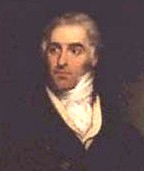| Profile | Major Works | Resources |
Michael Thomas Sadler, 1780-1835.

English businessman from Yorkshire, radical Tory MP and leader of the factory reform movement.
Elected to parliament in 1829, Michael T. Sadler is perhaps best known for his campaign to limit work hours and improve conditions for child laborers. Although unsuccessful during his parliamentary term (cut short by the parliamentary reform of 1832 - Sadler lost his seat), the campaign he started and the evidence he gathered eventually led to the new laws curbing child labor.
In economics, Sadler's main claim to fame is his 1830 Law of Population. Malthus's old population doctrine recently had come under attack by Nassau William Senior in 1829, who posited instead the "demographic transition", that fertility actually declines with prosperity as people naturally preferred to limit their families in order to achieve a "better" standard of living for themselves. As Senior's argument gained ground against Malthus's, Sadler leaped into the fray with what seemed like a compromise, and proposed in his 1830 treatise, a modification of the Malthusian law, suggesting that population growth depended not only on food (as Malthus proposed), but also on space (Sadler's addition). Thus the Malthusian law, Sadler proposed, would be weaker in places with greater population density ("the prolificness of otherwise similarly circumstanced, varies with their numbers", v.2, p.352). As wealthier countries and places tended to have greater population density, it only seemed like fertility rates declined with wealth. Sadler did not really explain the basis of his case - his voluminous work reviewed many of the past arguments about fertility, but he did not really connect the population density argument to them. He simply assumed that population growth was greater in the countryside than in the cities.
Sadler's argument was famously attacked by Thomas Macaulay in the Edinburgh Review and George Poulett Scrope in the Quarterly Review.
|
Major Works of Michael Sadler
|
|
HET
|
|
Resources on Michael T. Sadler
|
All rights reserved, Gonšalo L. Fonseca
